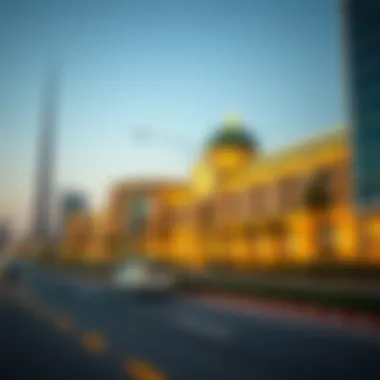Navigating Dubai's Real Estate Market: A Comprehensive Guide


Intro
Dubai, often referred to as the 'City of Gold,' is a remarkable blend of opportunity and extravagance. At the heart of this metropolis lies its dynamic real estate market, where property values soar and the skyline tells stories of ambition and innovation. Navigating this landscape can be daunting, but understanding its intricacies is crucial for anyone looking to make a mark here.
From the shimmering towers of the Burj Khalifa to the luxury villas lining the Palm Jumeirah, the choices are as diverse as they are plentiful. Furthermore, several factors shape the market dynamics, including economic policies, demographic shifts, and global investment trends. Understanding these elements is fundamental for prospective homebuyers, investors, and real estate professionals alike.
In this article, we will walk through the current market trends, investment opportunities, and the legal framework that shapes Dubai's real estate sector. Whether you are an experienced investor or a first-time buyer, this guide aims to provide you with the knowledge needed to navigate this vibrant and often complex environment with confidence.
As we venture deeper into the property landscape, we will uncover potential hotspots and identify property types that promise higher returns on investment. Furthermore, this journey will illuminate not only the lucrative prospects but also the considerations necessary for informed decision-making. With this understanding, one can truly appreciate what it means to invest in the 'City of Gold.'
Let’s dive in.
The Essence of Dubai: More Than Just a City
Dubai is not merely an urban hub; it represents a unique tapestry woven from threads of ambition, innovation, and tradition. This section serves as a cornerstone in our exploration of the city's real estate landscape, as understanding the essence of Dubai provides essential context for any investment or property decision. The city epitomizes a fusion of the old and new, offering diverse experiences that extend beyond surface-level attractions.
Historical Context of Dubai
To truly grasp the character of Dubai, one must consider its history. Once a modest fishing village with pearling as its backbone, Dubai's transformation into a global metropolis happened swiftly yet decisively. In the late 20th century, the discovery of oil acted as a catalyst for rapid development, prompting the city's leaders to envision a future that reached far beyond reliance on hydrocarbons.
Much of Dubai's wealth and power can be traced back to the late 1960s and 1970s when visionary leadership began to lay the groundwork for what would become a bustling international trade center. Sheikh Rashid bin Saeed Al Maktoum, the architect of modern Dubai, invested in infrastructure that attracted businesses from across the globe. The plans that were put in place still resonate today, enabling entrepreneurs from various sectors to set roots in this thriving land. A striking aspect of Dubai's history is its focus on creating free zones, specialized areas where businesses operate with fewer restrictions, enabling an environment conducive to rapid growth and innovation.
Cultural Significance
Dubai's cultural significance cannot be understated. It serves as a melting pot for diverse nationalities and cultures, where expatriates make up over 80% of its population. This blend not only enriches the social fabric but also influences the real estate landscape.
The local culture is steeped in traditions that reflect its Bedouin past. Architectural marvels, such as the Sheikh Mohammed Centre for Cultural Understanding, exemplify how the city values its roots while embracing modernization. Events like the Dubai Shopping Festival and Art Dubai highlight its position as a cultural and entertainment epicenter, making it attractive for property investors who recognize the value in such vibrancy.
Moreover, the presence of global events such as Expo 2020 has elevated Dubai’s profile on the world stage, further impacting the real estate market. Investors are keen to tap into the potential that comes with a city known for its cultural significance and forward-thinking approach.
"A city with the spirit of innovation and a tapestry of cultures, where the past meets the future in unexpected ways."
Understanding the essence of Dubai, through both its historical context and cultural significance, provides essential insights for anyone looking to navigate the complex real estate landscape. Through this lens, potential buyers and investors can make more informed decisions, ensuring alignment with the city’s ethos and future direction. These elements set the stage for exploring the properties and investments that characterize the City of Gold.
The Concept of the 'City of Gold'
Dubai, often termed the 'City of Gold,' stands out as a beacon of opportunity in the global real estate scene. This designation isn't just about wealth; it encompasses a rich tapestry of culture, innovation, and economic power. Recognizing these themes is crucial for investors and those planning to make Dubai their home.
Origins of the Nickname
The nickname 'City of Gold' has deep roots in Dubai’s history, primarily linked to its flourishing trade in gold and precious metals. During the late 20th century, Dubai positioned itself as a regional hub for gold trading, with the Gold Souk, a sprawling market still alive today, at its heart. Here, a dizzying array of jewelry pieces gleam under the bright lights, attracting both tourists and serious investors alike.
The phrase also reflects a branding strategy by the government, aiming to showcase the city’s affluence and allure. This clever marketing speaks to more than just the currency of gold—it symbolizes quality of life, robust infrastructure, and a thriving economy drawing in expatriates and businesspeople from around the world. The city exudes prosperity, where high-rises scrape the sky, and luxury vehicles zip through well-laid roads.
Economic Influence of Gold
The economic implications of gold in Dubai are multifaceted. It plays a pivotal role in several sectors:
- Trade and Commerce: Dubai's gold market has shepherded billions in transactions, making it the center of gold trading for the Middle East and beyond. This pivotal role fosters an environment ripe for various businesses, from retail to services and hospitality.
- Tourism: The allure of the gold market draws millions of visitors annually, with many planning their trips around the promise of finding exquisite, high-quality pieces. Tourists flock to experience the spectacle of luxury and often leave with treasures in hand.
- Investment Opportunities: Gold remains a tangible asset that has historically held its value. For many investors considering real estate in Dubai, gold can be a complementary investment, providing a hedge against fluctuations in the property market. As such, understanding this connection is key for anyone entering the market.
"Dubai's identity as the 'City of Gold' transcends mere wealth; it's an ideological anchor resulting in growth across economic sectors."
In sum, the concept of the 'City of Gold' is intricately woven into the fabric of Dubai's real estate landscape. The historical ties to trading, combined with the current economic realities, shape the decisions potential investors must consider. As gold continues to influence various spheres—be it commerce, tourism, or investments—it's pivotal for anyone engaging with Dubai's real estate to grasp this nuanced interaction.
Navigating Dubai's Real Estate Market
Understanding Dubai's real estate market is crucial for anyone looking to invest or live in this vibrant city. With a unique blend of tradition and modernity, Dubai's property landscape offers varied opportunities, but it is not without its own challenges. Navigating this market effectively can result in fruitful investments and a rewarding living experience.
Current Market Trends


Over the past few years, Dubai's real estate sector has witnessed several transformative changes. One prominent trend is the rise of off-plan developments. This allows buyers to purchase properties before they are completed, often at lower prices. Such approach not only caters to investor demand but also excites potential homeowners eager to see their investments grow.
Additionally, there has been a noticeable shift toward sustainability in design and construction. Many new projects feature green technologies and sustainable building practices, reflecting a growing eco-consciousness among developers and buyers alike. This trend is increasingly important as global awareness of environmental issues grows.
Moreover, the rental market is showing signs of recovery following the pandemic-induced slump. Many expatriates are returning, boosting demand for both residential and commercial properties. Consequently, rental prices are stabilizing, making it an opportune time for investors looking to capitalize on the revitalizing market.
Investment Opportunities
Dubai offers a wealth of investment opportunities that cater to various budgets and preferences. One key area involves luxury apartments and high-end villas, often sought after by wealthy expatriates and investors. The demand for these upscale properties remains robust, fueled by the city's reputation as a global hub for business and leisure.
Investors should also consider entering emerging neighborhoods. Areas like Dubai Creek Harbour and Dubai South are on the cusp of significant growth, with government-backed developments promising a wealth of amenities and lifestyle enhancements. These areas can yield attractive returns, especially for those willing to invest early.
Beyond traditional real estate, Real Estate Investment Trusts (REITs) have gained popularity. They offer a way for individuals to invest in property without the need to directly own physical assets. This method lowers the barrier to entry for many market players, allowing for diversification of investments across various property types.
Market Challenges
While the prospects in Dubai's real estate market are promising, investors should remain cognizant of certain challenges. One significant issue is the fluctuating market conditions. Prices can be volatile, influenced by various factors including economic shifts, international events, and local regulations. Investors need to conduct thorough research and market analysis to avoid potential pitfalls.
Additionally, navigating legal frameworks poses another challenge. Foreign investors must familiarize themselves with local laws regarding property ownership and rental regulations. Failing to do so can lead to costly misunderstandings or even legal complications.
Moreover, competition is fierce. With many local and international players operating in the market, distinguishing one’s investments or offerings can be quite the task. Investors must develop unique strategies to stay ahead, which could involve partnering with local experts or leveraging data analytics for smarter decision-making.
"Investments in Dubai's real estate are lucrative, but wisdom lies in understanding the landscape and being aware of its nuances."
Overall, navigating Dubai's real estate market is a dynamic endeavor. With the right approach and insights, investors and residents alike can find lucrative and satisfying opportunities in this remarkable city.
Types of Properties in Dubai
Understanding the different types of properties in Dubai is crucial for anyone looking to buy or invest in real estate within this vibrant city. The property landscape in Dubai is as diverse as its residents, catering to various lifestyles, budgets, and investment goals. This section will provide an overview of the primary categories of properties available in Dubai, with a focus on both residential and commercial options.
Residential Real Estate
Residential real estate plays a vital role in shaping the community vibe in Dubai. This segment of the market appeals to a wide range of buyers, whether they are expatriates, locals, or investors looking for rental income. Residential properties can be further divided into several categories, each offering unique advantages and considerations.
Luxury Apartments
Luxury apartments in Dubai stand out for their opulent designs and exceptional amenities. These properties often come equipped with state-of-the-art facilities such as infinity pools, spa services, and 24/7 concierge. The key characteristic that makes luxury apartments highly sought after is their prime locations, often situated in prestigious areas like Dubai Marina and Downtown Dubai.
Living in a luxury apartment can certainly elevate one's lifestyle, providing access to high-end shopping, fine dining, and vibrant nightlife—all just a stone's throw away. However, the price tag can also be a double-edged sword; while the potential for high returns exists, the initial investment is substantial and may not be suitable for everyone.
Villas and Townhouses
Villas and townhouses represent a more spacious option for families or individuals seeking a quieter lifestyle. Unlike apartments, these properties typically come with private yards and pools, making them attractive for those who value outdoor space. One of their main advantages is the community atmosphere they foster, often found in gated communities that prioritize safety and well-being.
The unique feature of villas and townhouses is the ability to customize the space; many come with options for renovations or expansions. However, potential buyers should consider the maintenance costs associated with larger spaces, as well as the homeowners' association fees that can sometimes apply.
Affordable Housing Options
Affordable housing options are becoming increasingly important in Dubai as the demand for more budget-friendly solutions rises. These properties cater to a demographic that desires the Dubai lifestyle without the hefty price tag associated with luxury real estate. Often located in up-and-coming areas, affordable housing can still provide access to essential amenities and community services.
The key characteristic of affordable housing options is their accessibility; they allow a broader range of residents to stake their claim in the city. However, buyers must be wary of potential trade-offs, such as quality or neighborhood vibrancy, which may differ from more affluent areas.
Commercial Properties
The commercial property landscape in Dubai is robust, offering a range of options for businesses and investors alike. From office spaces to retail units, each type presents unique benefits and challenges.
Office Spaces
Office spaces in Dubai are crucial for local and international companies looking to establish a presence in the region. They often feature modern layouts and strategic locations, possibly near key business districts like DIFC or Sheikh Zayed Road. The key characteristic of office spaces is flexibility, as many properties cater to various business sizes—from startups to established corporations.
The unique feature here is the stimulating environment; co-working spaces within larger buildings become hubs for networking and collaboration. However, rental rates can vary substantially, leading to budgetary challenges for some firms.


Retail Units
Retail units in Dubai offer a gateway for entrepreneurs looking to tap into a thriving market. These properties are strategically positioned in high-traffic areas, making them prime locations for businesses aiming to attract foot traffic. The appeal of retail units lies in their visibility and accessibility, both of which are essential for success.
One should also note the potential downsides; high competition and rising rental prices can pose significant challenges, especially for new entrants to the market.
Industrial Properties
Industrial properties serve as the backbone of the economy, supporting logistics, manufacturing, and warehousing. Located typically on the outskirts of major urban areas, these properties are characterized by their functionality over form. They frequently offer large-scale options equipped with loading docks and storage facilities.
The unique feature of industrial properties is their necessity for economic growth; as Dubai continues to develop as a global trade hub, these spaces are becoming more vital. However, the initial capital investment required can be intense, often requiring a comprehensive market analysis before committing.
Legal Framework Governing Real Estate
Understanding the legal framework surrounding real estate in Dubai is critical for anyone looking to invest, purchase, or even rent property in this dynamic market. This framework not only shapes property ownership but also guides the conduct of all parties involved in a real estate transaction. Without a solid grasp of these laws, investors may find themselves in murky waters, facing potential pitfalls that could result in significant financial losses or prolonged legal disputes. The legal framework provides a safety net, ensuring fair practice and transparency, thereby attracting a diverse pool of investors.
Property Ownership Laws
In Dubai, property ownership laws are quite progressive and aimed at encouraging foreign investment. The key aspect of these laws is the distinction between freehold and leasehold properties. Freehold ownership allows for absolute ownership of the property and the land on which it stands, while leasehold property typically grants usage rights over a specific period, usually up to 99 years.
The Dubai Land Department (DLD) governs these laws and ensures that they are clearly detailed and accessible. Furthermore, since 2002, non-UAE nationals have been allowed to buy property in designated areas. This policy signifies a deliberate shift towards globalization, making Dubai's landscape more attractive to expatriates and foreign investors alike. However, it is vital to ensure that property titles are clear, as disputes can arise if ownership records are not properly maintained.
Regulations for Foreign Investors
Foreign investors stepping into Dubai's real estate market should be aware of several regulations designed to protect both them and the local economy. Notably, foreign ownership is limited in specific developments, often designated as freehold areas. Investors are required to obtain a title deed for any property purchase, which must be registered with the DLD.
Additionally, the government has established a framework for conducting due diligence that includes vetting the developer and the property in question. Failure to conduct thorough research may lead to unpleasant surprises later on.
It's also worth mentioning that some regulations apply to rental properties, too. For instance, expatriates typically face restrictions on sub-letting their apartments without the landlord's consent. Understanding these nuances not only minimizes risks but also aligns investment strategies with legal stipulations.
Contractual Considerations
When it comes to buying property in Dubai, understanding contractual obligations is non-negotiable. Contracts should explicitly state the terms of sale, along with the rights and responsibilities of each party. It’s common practice for contracts to include a deposit—often around 10% of the property value—alongside an agreement detailing payment plans, completion dates, and other essential terms.
One major point to highlight is that contracts must comply with the laws set forth by relevant governmental bodies. Investors should consider seeking legal advice to ensure that contracts are both comprehensive and enforceable. An oversight in this area can lead to detrimental outcomes, leaving investors vulnerable to disputes.
In reviewing contracts, investors should also be wary of clauses that could lead to penalties or unexpected fees. Familiarity with these finer points can save stakeholders from potential heartaches down the road.
Investors should conduct thorough research and seek legal advice to ensure compliance with Dubai's property laws.
Financing and Investment Strategies
Understanding financing and investment strategies is crucial for anyone looking to navigate Dubai's dynamic real estate landscape. The right approach to funding can make or break a property investment in a market as unique as Dubai's. It often involves considering a mix of traditional mortgage options, exploring alternative investments like Real Estate Investment Trusts (REITs), and analyzing yield and return on investment (ROI) metrics. Each of these facets plays a significant role in ensuring one's financial footing is solid while embarking on property investments.
Mortgage Options for Buyers
When it comes to buying property in Dubai, potential buyers might be faced with a range of mortgage options. These natural pathways often hinge on several factors including nationality, property type, and financial history.
- Fixed-rate Mortgages offer stability as they allow buyers to lock in the interest rate for the duration of the loan. This predictability can be very comforting in a city where fluctuations can occur.
- Variable-rate Mortgages, on the other hand, can initially offer lower rates that may adjust over time. While this option could lead to cost savings in the short-term, it carries the risk of increasing payments in the long-term.
- Additionally, many banks in Dubai also offer Islamic financing options, which adhere to Sharia law, making them particularly attractive to Muslim home buyers.
It’s advisable for buyers to shop around, assess the fine print, and ensure they understand the conditions linked to each mortgage product before diving into a decision.
Investment Funds and REITs
Investing in real estate is no longer just for those who can afford direct ownership. With the rise of Investment Funds and Real Estate Investment Trusts (REITs), individuals can now access Dubai's property market without the hassle of managing physical properties. REITs, in particular, have gained traction due to their listing on stock exchanges, allowing investors to buy shares easily. This can serve both as a passive income source through dividends and as a way to diversify one's investment portfolio without committing extensive capital directly into property purchases.
In Dubai, many factors contribute to the attractiveness of REITs and investment funds:
- Liquidity: Investors can buy and sell shares on the stock market, unlike buying property outright, which entails a longer commitment.
- Professional Management: These funds are typically managed by seasoned professionals, giving investors confidence that their money is being handled smartly.
Yield and ROI Analysis


Yield and return on investment analysis are vital for any investor considering properties in Dubai. Understanding how to calculate these metrics can often reveal hidden opportunities or pitfalls in a potential investment.
- Yield: This is typically calculated by dividing the rental income from a property by its purchase price. A strong yield can indicate a well-valued asset.
- ROI: This measures the profitability of an investment relative to its cost. A clear understanding of your costs versus potential income can help you make informed decisions.
Investors should also be mindful of market conditions, location, and property type: all of which can influence both yield and ROI. A well-located apartment in a thriving district can lead to much higher returns compared to a similar property in a less desirable area.
Ultimately, making sense of financing and investment strategies in Dubai's real estate realm requires meticulous planning and analysis. Prospective buyers and investors must remain informed and adaptable to the ever-changing market conditions.
Lifestyle and Community Aspects
Understanding the lifestyle and community aspects of Dubai is essential for anyone interested in its real estate landscape. This vibrant metropolis is not just about stunning skyscrapers and luxury malls; it encompasses a rich cultural tapestry and a distinctive way of life that attracts residents from around the globe. The blend of tradition and modernity plays a major role in shaping the community experience.
Living in Dubai offers more than just an address. It’s about being part of a dynamic society teeming with possibilities. From diverse culinary experiences to world-class entertainment, residents benefit greatly from the city's unique offerings. Moreover, community involvement is highly encouraged, often seen in the numerous festivals and events that celebrate various cultures.
Living in Dubai: A Comprehensive Overview
Relocating to Dubai presents both a thrilling adventure and a few challenges. The city's infrastructure is modern and efficient, making getting around relatively easy. Public transportation, like the metro and buses, is convenient, clean, and affordable, linking residents to various neighborhoods and attractions.
Dubai's neighborhoods are each distinct, possessing their own character. For instance, areas like Downtown Dubai are known for their cosmopolitan vibe, while places like Jumeirah draw people looking for a quieter, beachfront lifestyle. Here are some factors worth considering:
- Safety: Dubai is one of the safest cities in the world. With a low crime rate, families often feel secure.
- Education: The education system boasts a mix of international curriculums, making it easy for expatriates to find suitable schools for their children.
- Healthcare: Residents benefit from high-quality healthcare facilities, which are both public and private, ensuring accessibility and quality service.
- Social Life: The social scene is vibrant, accommodating everyone from young professionals to families seeking wholesome activities.
Community centers, parks, and recreational facilities further enhance the quality of life in Dubai. These spaces often organize workshops, sports events, and social gatherings, fostering connection among residents.
Expatriate Experience
For expatriates, living in Dubai can be akin to stepping into a melting pot of cultures, languages, and traditions. The diverse community allows expatriates to find a slice of home while residing in a bustling city full of opportunities. Integration is facilitated through various expatriate groups and clubs where individuals can share experiences and build friendships.
However, adapting to the UAE's customs and practices is vital. Understanding local laws, societal norms, and cultural etiquettes can smoothen one’s transition into daily life in Dubai.
Consider these elements when examining the expatriate experience:
- Language: Though Arabic is the official language, English is widely spoken, making communication easier for newcomers.
- Community Engagement: Many expatriates become actively involved in charity events, sports leagues, and cultural festivals, nurturing a sense of belonging.
- Employment Opportunities: The job market in Dubai is competitive but flourishing, especially in sectors like finance, technology, and tourism.
- Lifestyle Adaptation: Shops, restaurants, and social events cater to various tastes, allowing expatriates to experience a familiar yet unique lifestyle.
In summary, the lifestyle and community aspects of Dubai are pivotal in shaping its real estate sector. Investors and potential buyers should consider these elements when making decisions, as the environment one lives in ultimately influences property desirability and value.
"Dubai is where the future meets tradition, offering a lifestyle that is both exciting and rich."
For those looking for additional information on living in Dubai, you can check resources from Wikipedia and Britannica.
Whether you are a potential buyer or an expatriate, understanding the intricate lifestyle dynamics could be key to making informed choices in this city of opportunities.
The Future of Dubai Real Estate
Understanding the future of Dubai's real estate market is paramount for various stakeholders, including investors, buyers, and expatriates. With the city continuously evolving, staying ahead means recognizing trends, innovations, and upcoming transformations. The resilience of this market during global economic fluctuations highlights a robust framework designed to attract investment, facilitate development, and promote sustainability.
As the city gears up for several future projects, both large-scale and community-focused, grasping the implications of these developments can underscore opportunities that might be worth exploring. Moreover, the emphasis on sustainable practices positions Dubai to balance economic growth with environmental stewardship, a critical consideration for the savvy investor today.
Upcoming Developments
Dubai has never been one to rest on its laurels. The skyline is a testament to ambition, and the future promises even more. Significant projects are in the pipeline, including:
- Dubai Creek Tower: Set to stretch higher than the Burj Khalifa, this marvel aims to redefine architectural boundaries. By being a central hub for tourism and real estate, the surrounding area is expected to see increased property demand.
- Dubai Expo 2020 Legacy Projects: With Expo 2020 leaving behind a transformative legacy, developers are keen on utilizing the infrastructure and facilities built for this global event. Developments in and around the Expo site are projected to attract residential and commercial interests alike.
- New Urban Communities: Initiatives like Dubai Urban Master Plan 2040 aim to create integrated living environments that cater to the needs of families and professionals. Expect mixed-use spaces that foster community engagement while offering essential amenities.
These developments bring a mix of high-end luxury with more affordable options, thereby widening the market's appeal. However, with the increasing supply, an astute investor must consider location dynamics and user demographics to ensure profitable investments.
Sustainable Practices in Real Estate
As the world shifts towards a greener future, Dubai's real estate sector is no exception. The integration of sustainability isn't merely a trend; it's becoming a necessity. Builders and developers are embracing eco-friendly practices, which not only enhance property values but also attract environmentally-conscious buyers.
Key sustainable initiatives include:
- Green Building Regulations: Dubai's building codes have incorporated strict eco-friendly requirements. Projects that meet these standards often receive green certifications that appeal to both buyers and investors.
- Energy Efficiency: Many new developments focus on incorporating energy-efficient systems, from solar panels to smart home technology. This reduces utility costs and presents a selling point in a market striving for lower carbon footprints.
- Water Conservation: Innovations in water management and landscaping have become prevalent, aimed at reducing wastage and promoting recycling. Smart irrigation systems, for instance, are being widely adopted in communal areas.
Investors who prioritize sustainability in their portfolios not only align with global trends but also capitalize on potential tax incentives and increased market desirability.
"Sustainability is no longer a buzzword; it's the bedrock of modern real estate development in Dubai."







